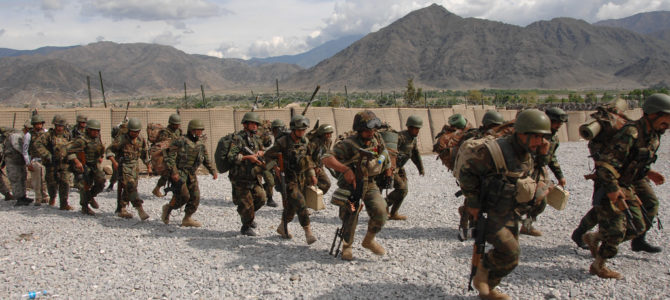
In a startling new paper from the Center for Strategic and International Studies, retired colonel Mark Cancian writes about the Afghanistan War. The United States and the Taliban stand on the brink of a framework that would lead to a peace process charting the path for the American troops to come home.
Cancian asks a simple question. The war in Afghanistan was already won by the end of March 2002. The Taliban was decimated, al-Qaeda scuttled, and a government manned by various warlords in place. Why did the United States not leave immediately?
Cancian’s answer wouldn’t surprise anyone who opposed nation-building even in the early days of 2003. The fault was a lack of study of history—not just modern history, but any history. He writes that U.S. foreign policy mavens and defense planners thought there was a difference between Soviets’ war in Afghanistan and the Western war in Afghanistan.
The common understanding was that the Soviets were occupiers, and the Anglo-Americans were liberators; the Soviets tried to preach communism, while liberal democracy is a natural universal value waiting for everyone to adopt; and the Russians were violent, while the Westerners made sure that civilians were protected even during the war.
These are of course true, and the Russians were far more brutal than the Americans ever were. But Cancian points out that none of that matters to the average Afghan. In its Afghanistan War Americans learned, according to the report, what the Soviets learned the hard way.
The lessons of the war were these. Afghans are mostly illiterate, with no concept of a nation-state. To them, the sense of national duty means nothing compared to their duty to their immediate tribes. Even in the glory days of the 1960s, often parroted in the media accompanied by images of short skirt-wearing female students at Kabul University, the liberals in Afghanistan were secluded in corners of cities, with the majority of the country under uncharted semi-feudalism.
To the Afghans, Cancian writes, “the Americans and the Soviets looked very much alike. Both were infidels, came from far away, had alien manners, and spoke an alien language. Both brought modern weapons of war. Both sought to change the culture in ways that conservative Afghans found objectionable. Not surprisingly, therefore, both faced an insurgency that was often led by the same people.”
The British experience in Afghanistan, even in the 19th century, was similar. Britain realized at one point that Afghanistan was ungovernable and it would need regular raids and punitive wars, but overall the rule of Afghanistan should be left to allied warlords as a buffer to Iran and Russia. Britain subsequently focused on governing India, which had a pre-existing and prosperous civilization, and let Afghanistan be Afghanistan: a land often raided and punished, but never occupied, conquered, or liberalized.
The report is historically accurate and surprisingly provocative and jarring, for one coming out of a DC think tank. One is not used to see such reports from “the blob,” which are often about vague fund-grabbing, in jargon-filled gibberish like “empowering civil society” and “maintaining the vectors of foreign aid policy.”
Even now, there’s significant pushback against any sort of a deal with the Taliban, even when Americans overwhelmingly support a retrenchment. Consider this Atlantic article lamenting any withdrawal in Afghanistan as possibly leading to a sort of a Vietnam effect, a sense of restraint and refusal to join any nation-building adventures. Or consider another one, in which David Petraeus, of all people, warns that any troop return will result in the Taliban controlling Afghanistan.
The arguments are all cliched. As any sane individual understands, what these suggestions essentially imply is the formation of an imperial entity, an American empire, that should be prepared to stay in Afghanistan. For how long, none of these suggestions ever mention. Possibly as long as the empire lasts.
That is theoretically okay, except the Americans are possibly not interested in policing the world with their own lives and dollars. Also, as anyone with an ounce of knowledge of the local history would tell you, the Taliban will still be there in Afghanistan and perhaps take over Kabul as soon as it can after the moment America comes out, whether that’s today, tomorrow, next year, or in 50 years’ time.
The unfortunate reality of the situation that no one mentions in polite circles is that through a curse of geography the region is doomed to suffer from its own vices until by some miracle the people of the lands come up with their own version of the Magna Carta, or their own James Madison.
The Trump administration is apparently close to a deal. I am not optimistic about trusting the Taliban’s words. I also think that is frankly irrelevant. If the end game was to ensure the decimation of al-Qaeda and an unstable local balance with all local actors from China to India involved, the war was over long time back. If the end game is a Switzerland in Central Asia, it is simply unachievable. As for ISIS, al-Qaeda, or Taliban turning rogue, punitive raids, with local allied warlords bringing brutal order, should be the American grand strategy.
Conservative-realists are not pacifists. But realists understand what needs to be prioritized. America came out of Vietnam and still went on to win the Cold War by conserving resources and investing in technology at home. As a new Cold War looms in Asia, it is time to refocus.
The total cost of land wars in Asia was more than $5.9 trillion. For better or for worse, Trump remains the first president in the last 25 years to not have started a new humanitarian war or nation-building. If he understands prudence and glory, he should take this opportunity to cut a deal, and bring American troops home.









